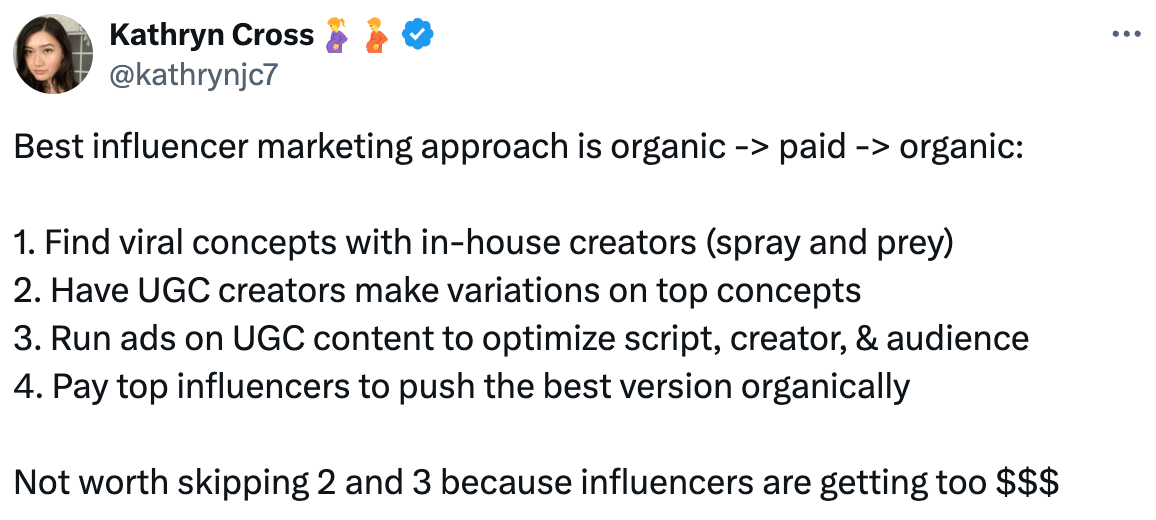Hey y’all — here’s today at a glance:
Opportunity → IG Enhancement
Framework → Influencer Marketing Playbook
Tool → Chargeflow
Trend → Emotion AI
Quote → Sam Walton’s Founder Mode
PS — Become a member to get access to my founder membership including an engaged community, fundraising support, fireside chats and more.

🔗 Houck’s Picks
My favorite finds of the week.
Why your startup shouldn’t announce a seed round (Link)
Observations on whats happening currently in pre-seed and seed rounds (Link)
The 4 secret ingredients of the best pitch decks (Link)
10-step guide to finding and onboarding an overseas assistant (Link)
Why your product idea sounds too complicated and how to simplify it (Link)

💡 Opportunity: IQ Enhancement
Ambitious ideas aren’t complicated.
In fact, they’re often deceptively simple. If you told someone your mission was to “to help anyone feel at home anywhere” they’d probably respond with something like… ok… how?
Or maybe they’d just ignore you and not believe it was specific enough to lead to anything real.
But that was an early mission statement from Airbnb.
Slack’s was to “make work life simpler, more pleasant, and more productive.”
Instagram’s was “to capture and share the world’s moments.”
You get the idea.
This happens because the best companies come out of problems that are so broad that they are easy to understand for anyone. The details come about in the solution, not the mission.
The more you have to explain it, the riskier it is.
So, these days, when I hear a simple and easy to understand problem or idea, my ears perk up.
Here’s one I saw this week:
Imagine a company whose mission statement was something like “Increase biological humans’ ability to understand the universe.”
What would that company build?
I don’t know, but I can guarantee it’d be a big, interesting swing.
🧠 Framework: Influencer Marketing Playbook
The “creator economy” might’ve died in 2021, but influencer marketing continues to become increasingly important.
The truth is — there are thousands of creators out there in your niche who platform algorithms know are likely to but out authoritative content.
But learning how to make great content is a full-time job. So founders are left with two options:
Hire a ghostwriter (like my team)
Pay creators to post content about your product
If you choose option 2, these creators will ask for guidance about what the content should be like, and you might not have the answers.
Here’s the right approach:
We’ll be building this into Megaphone next month, as well. I’ll share more when it’s ready.
🛠 Tool: Chargeflow
Chargeflow is the world's first AI-powered chargeback management platform, assisting over 2,000 SaaS companies, such as WordTune and Elementor, in preventing and disputing chargebacks.
Signing up takes less than 90 seconds, and our pricing is success-based — you only pay when we successfully win or prevent chargebacks.
Get 50 chargebacks prevented for free for your business.*
📈 Trend: Emotion AI
Most people are bad at understanding their own emotions, but AI isn’t.
Using videos or images, LLMs can remarkably precisely determine how someone is feeling.
And, as you can imagine, there are many scenarios where understanding someone’s emotions can be valuable.
Here’s one startup idea:
Job interview or sales software that tells the employer how the candidate / potential client is feeling during each moment of the call. In both cases, getting real-time information about this can positively impact the employer’s read on the situation and ability to reach a good outcome.

💬 Quote: Sam Walton’s Founder Mode
Earlier this year, Paul Graham’s founder mode essay generated buzz because it articulated something all founders see and intuitively know, but haven’t articulated themselves.
It’s what founders know but business schools oppose — that hiring “professional” managers and “getting out of their way” tends to be a worse choice than just being a micromanager or, as Brian Chesky puts it, “in the details.”
PG is a master at explaining concepts concisely, and it’s likely the essay will inspire both good and bad founder behavior over the next few years.
But it’s not a new concept.
Walmart’s Sam Walton, who founded the company in 1945, had his own version:


How We Can Help
Become a member to get full access to our case study library, private founder community, and more.
We can also help your startup in a few other ways:
Content Creation
Let my team and I ghostwrite for your newsletter, X, or LinkedIn.
Audience Building
Grow your audience + generate leads with my growth service.
Fundraising
Share your round with hundreds of investors in my personal network.
Advising
I’ll help solve a specific challenge you’re facing with your startup.
Advertise in this newsletter to get in front of 60,000+ founders.

“*” indicates sponsored content.



